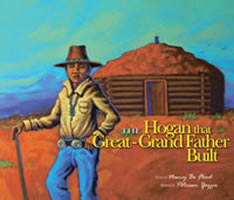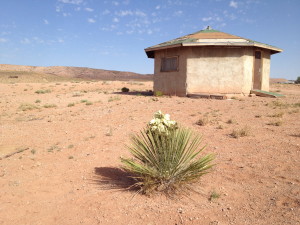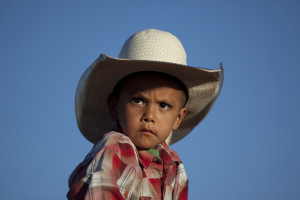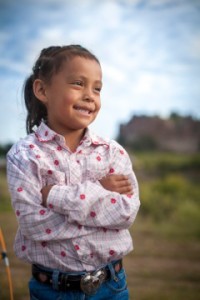Nancy Bo Flood, a contributor to The Pirate Tree, is also the author of several books related to or set in the Navajo Nation. Her most recent picture book, The Hogan that Great-Grandfather Built, takes the structure of “This is the house that Jack built” to re-create and reveal the Navajo concept of “home.” I spoke with her about the book and the place of Navajo culture in her life.
1. Can you talk a little bit about your time living on the Navajo Reservation in Arizona? You clearly have a heart connection to Navajos, given the number of books you’ve written that have Navajo protagonists. In what ways did the Navajo people and their culture touch your heart? How do you feel connected to them? How do I feel connected?
Nancy Bo Flood: They have been neighbors, friends and also graduate students in my classes. I have learned from them.
2. One of the themes you really focus on in this picture book is the way Navajos value the home or the hearth. Can you explore a little bit about why the home/hearth is so important to Navajos? This book also features the strong connection Navajos have to family and to ancestors, as symbolized in this home that great-grandfather built.
Nancy Bo Flood: “Hogan means family means home.” Where ever a Navajo family lives, their “home” is where home has always been, Hogan represents this place, this long multi-generational clan lineage of “this is where I come from; this is
who I am.” For the Navajo, I am part of this place, these people. My relationship with the people of my clans defines who I am. Hogan is the place that visually represents “this is where I come from, this is who I am.” A hogan is made from the earth – out of “earth, water and trees”. We are all connected and all is alive – very metaphysical, very powerful. The rounded shape of the hogan represents mother earth. At the very top of the roof is an opening so the sweet smoke from a cedar fire can rise up but also so father sky can be seen. The one door always faces east so the warmth and light of a new dawn can be felt. One greets a new day with prayer and thanksgiving, traditionally, running toward the rising sun. So when I Navajo student goes to Harvard or to University of Arizona to study, home is always “back on the Rez,” where family is. All important ceremonies are held at the family’s traditional hogan, even though most family members live in a modern house or skyscraper apartment in Los Angeles or Denver.
Can you talk about what challenges modern Navajo families face? Can you talk about ways Navajos have attempted to respond to those challenges? Despite challenges, what values/cultural traditions have Navajos been able to hold onto and transform as they move into the future?
Nancy Bo Flood: The Navajo work to keep their traditions alive and well through family, through their traditional ceremonies, celebrations and through language. Also, through rodeo! Family is the center of everything. One introduces oneself by naming one’s clans, for example, this is how my friend, Rose, would introduce herself to you:
My name is Rose Ann Tahe and I’m from Many Farms, Arizona, Da’ak’ehalanidee’ naasha. I am Navajo, Dine nish’li. I am born into my mother’s clan, the Red Running into the Water Clan (Naaneesh’t’ezhi Tachii’nii nish’li), born for my father’s clan, Salt Clan (Ashiihi bashish’chiin). My maternal grandparents’ clan is One Who Walks Around You (Honighaanii dashichei) and paternal grandparents is Red Bottom Clan (Tl’aash’chi’i ei dashinali).
This is who I am and where I am from.
What is something you think mainstream American culture could learn from Navajos that would change the way we live in the world?
Nancy Bo Flood: Walk in Beauty, which means walk in peace and harmony with all around you: above you, below you, before and after you. Now that is something to think about and try to do! What does that mean specifically? Cooperation, work together, rather than in competition with each other. Forgiveness – forgive those who have frustrated you, injured or bullied you, called you names, pushed ahead in line at the grocery store, taken your parking space, taken your home and land, burned down your orchards. Forgive. Walk in Beauty. All is connected – a metaphysics view of life – so simple and with the hope and potential of peace. Walk in Beauty.




2 comments for “Nancy Bo Flood: on the place of home and Navajos in her heart and books”